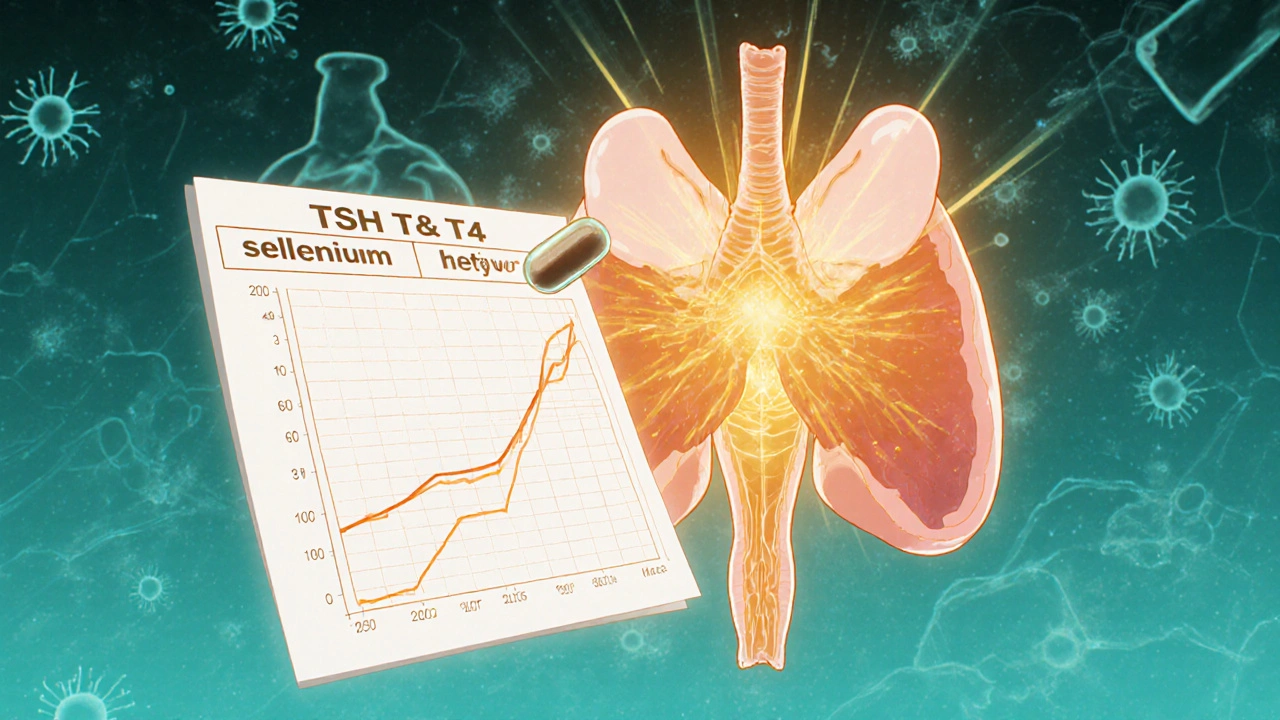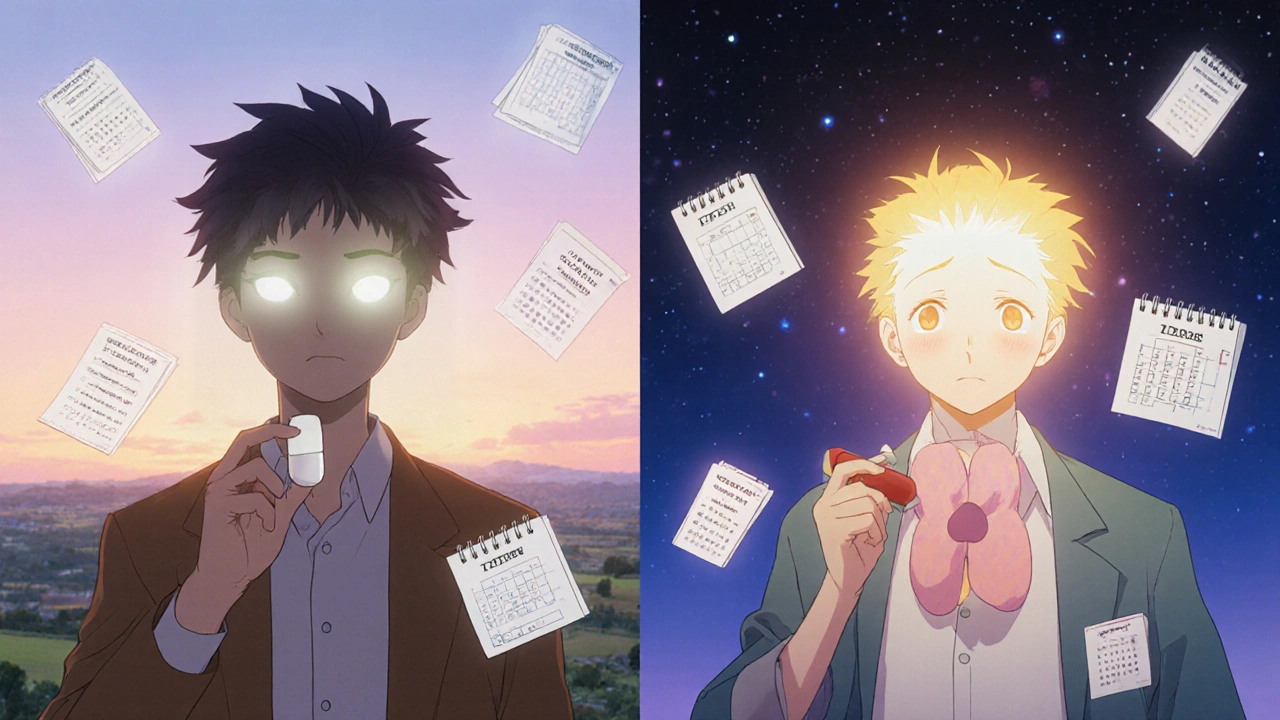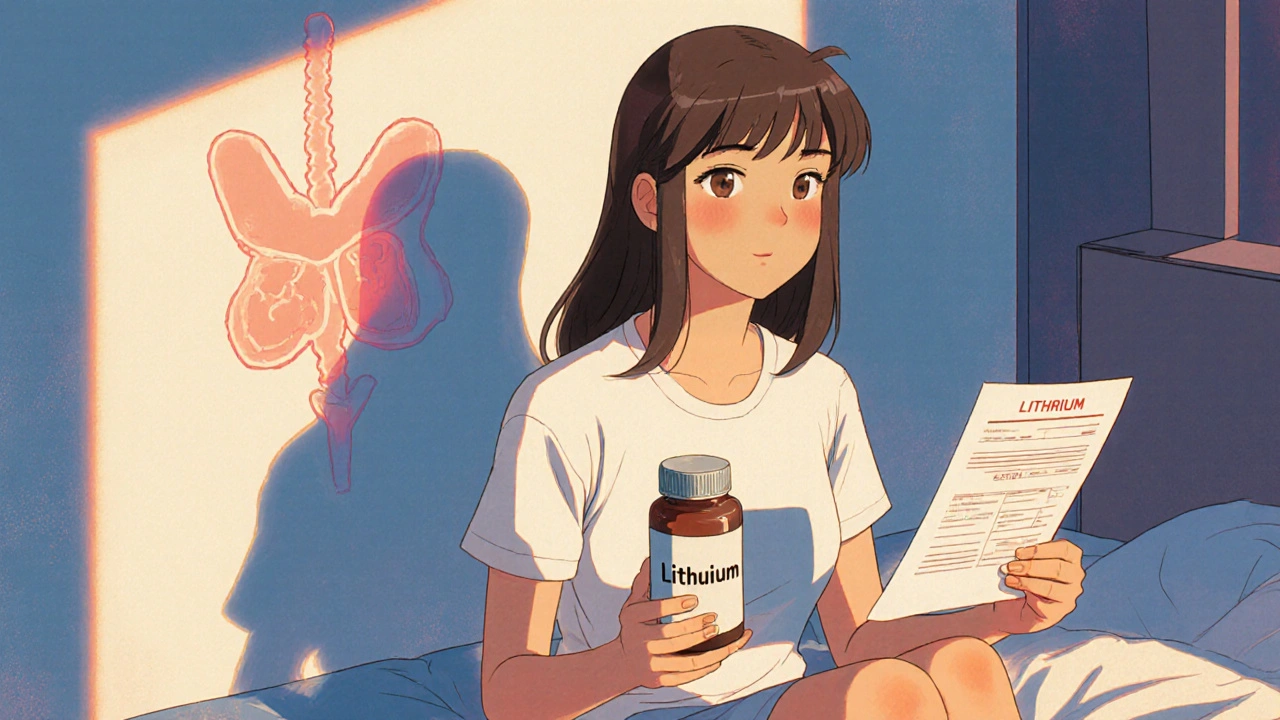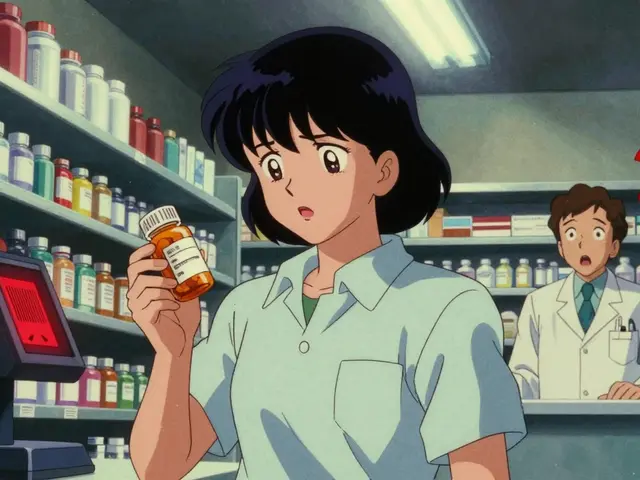Lithium Thyroid Risk Calculator
Your Personalized Risk Assessment
When you’re taking lithium for bipolar disorder, your mood might be stable-but your thyroid might not be. Lithium is one of the most effective medications for preventing mania and depression, but it doesn’t come without trade-offs. One of the most common and often overlooked side effects is its impact on thyroid function. About one in five people on long-term lithium therapy develop hypothyroidism. For some, it’s mild. For others, it’s life-changing fatigue, weight gain, and brain fog that don’t go away-even with thyroid medication. The good news? You don’t have to choose between mental stability and physical health. With the right monitoring and management, you can stay on lithium and keep your thyroid working.
How Lithium Messes With Your Thyroid
Lithium doesn’t just calm your mood-it interferes with how your thyroid makes and releases hormones. It blocks iodine from binding to thyroglobulin, the protein that holds the building blocks of thyroid hormones. It also stops the thyroid from releasing those hormones into your bloodstream. Even worse, it slows down how your body converts T4 (the inactive hormone) into T3 (the active one). This means your body doesn’t get enough usable thyroid hormone, even if your thyroid is still trying to produce it.
Over time, this can lead to goiter-an enlarged thyroid. Studies show 30% to 59% of people on lithium develop goiter, especially after five or more years of use. In places like Denmark, where iodine levels in the diet are lower, goiter rates hit 50%. In the U.S., where salt is iodized, it’s closer to 30%. But even in iodine-sufficient areas, the risk doesn’t disappear.
And it’s not just about size. About 20% to 32% of people on lithium end up with hypothyroidism, meaning their TSH (thyroid-stimulating hormone) climbs while their T4 drops. Women under 60 are at especially high risk-up to three times more likely than men to develop thyroid problems on the same dose. And the higher your lithium dose, the greater your risk. For every 100 mg increase per day, your odds of thyroid dysfunction go up by 27%.
Hypothyroidism: The Most Common Problem
If you’re on lithium and suddenly feel exhausted, gain weight without changing your diet, or get cold easily, your thyroid might be the culprit. TSH levels often rise slowly-sometimes taking 6 to 8 weeks after starting lithium to show up on a blood test. That’s why many doctors miss it early. A TSH of 4.5 might seem "normal" to a general practitioner, but for someone on lithium, even a TSH over 2.5 can signal trouble.
Once hypothyroidism is confirmed, levothyroxine is the standard treatment. But here’s the catch: people on lithium often need higher doses than others. Studies show they require 20% to 30% more levothyroxine to get TSH back into the normal range. Why? Because lithium keeps interfering with how the body uses the hormone. You might take your pill, check your TSH, and think you’re fixed-only to find it creeping up again. That’s not your fault. It’s the lithium.
One Reddit user with 12 years on lithium wrote: "My TSH went from 1.8 to 8.7 in 18 months. I’m on 75 mcg of levothyroxine now, but my psychiatrist won’t lower my lithium dose even though I’m still tired all the time." That’s not uncommon. Many patients feel stuck: they need lithium to stay stable, but the thyroid meds aren’t fully fixing the fatigue. Some even report unexplained weight gain despite normal TSH levels. That’s because lithium doesn’t just affect hormone levels-it can mess with metabolism, appetite, and energy use at a cellular level.
Hyperthyroidism: Less Common, But Still Dangerous
While hypothyroidism is the main concern, lithium can also cause hyperthyroidism-though it’s rarer. Only 3% to 5% of users develop it. Most cases aren’t Graves’ disease. Instead, it’s painless thyroiditis: your thyroid gets inflamed, leaks stored hormones, and causes temporary symptoms like anxiety, heart palpitations, or weight loss. It usually clears up on its own in 3 to 6 months without needing antithyroid drugs.
But here’s the scary part: stopping lithium suddenly can trigger a thyroid storm. There’s only one documented case, but it happened after hemodialysis for lithium toxicity. The body released a flood of stored thyroid hormones all at once. That’s why, even if you’re feeling fine, never quit lithium cold turkey without medical supervision. Your thyroid might be quietly holding onto extra hormones, waiting for the right moment to go haywire.

How Lithium Compares to Other Mood Stabilizers
Not all mood stabilizers affect the thyroid the same way. Valproate can cause mild TSH spikes in 5% to 10% of users, but it rarely leads to full-blown hypothyroidism. Carbamazepine? Almost no thyroid effect. Lithium? It’s in a league of its own.
Here’s why that matters: lithium is still the gold standard for preventing suicide in bipolar disorder. A 2013 BMJ study found it reduced suicide attempts by 14% compared to other drugs. That’s huge. So even with thyroid risks, many patients and doctors choose to stick with it. But that doesn’t mean you should ignore the thyroid. You just need a smarter plan.
What You Should Do: Monitoring and Management
The American Thyroid Association says this: get a TSH and free T4 test before starting lithium. Then test every 6 months for the first year, and at least once a year after that. If you’re a woman, over 50, or have a family history of thyroid disease, test every 4 to 6 months-even if you feel fine.
Don’t panic if your TSH is slightly elevated in the first 3 months. That’s common. Many primary care doctors mistakenly stop lithium because of this. One JAMA study found 23% of patients had lithium discontinued unnecessarily during that early window. Wait. Monitor. Give it time.
If you’re diagnosed with hypothyroidism, start levothyroxine. But don’t assume your dose will stay the same. Re-test every 6 to 8 weeks after starting or adjusting the dose. Lithium changes how your body responds. You might need more than someone not on lithium. And if you’re taking other meds like gabapentin or antidepressants, your risk goes up even more.

New Hope: Selenium and Future Treatments
There’s good news on the horizon. A 2023 clinical trial found that taking 100 mcg of selenium daily cut the risk of hypothyroidism in lithium users from 24% to 14% over two years. Selenium helps your thyroid process iodine better and reduces inflammation. It’s not a cure, but it’s a simple, safe add-on that could make a big difference.
And researchers are working on lithium alternatives. A new compound called RG101 is in Phase II trials and shows similar mood-stabilizing power-but without the thyroid disruption. Early results show TSH levels staying normal. If it works, it could change the game.
When to Consider Stopping Lithium
Not everyone can tolerate thyroid issues. If you’re on high-dose levothyroxine, still exhausted, gaining weight, and your mood is stable, it’s worth talking to your doctor about alternatives. Lamotrigine, quetiapine, or even a combination of lower-dose lithium with another mood stabilizer might work.
But don’t rush. Lithium’s benefits-especially for suicide prevention-are unmatched. If your thyroid is managed well, and you’re feeling mentally stable, staying on lithium is often the best choice. The goal isn’t to quit lithium. It’s to manage your thyroid so well that lithium doesn’t have to cost you your energy, your weight, or your quality of life.
Real Stories, Real Choices
On Reddit, one user wrote: "I’ve been on 900 mg of lithium for 8 years. My thyroid is perfect. I test every 6 months. No issues." Another said: "I was on lithium for 10 years. My TSH kept climbing. I switched to lamotrigine. My mood is okay, but I miss the clarity I had on lithium. I wish I’d known about selenium earlier." There’s no one-size-fits-all. But there is a path forward: test early, test often, treat smartly, and don’t accept fatigue as normal. Your thyroid matters as much as your mood.
Can lithium cause permanent thyroid damage?
In most cases, no. If you stop lithium, your thyroid function often returns to normal within months. But for some people-especially those with pre-existing autoimmune thyroid disease-hypothyroidism can become permanent. That’s why regular monitoring is critical. If your TSH stays high even after stopping lithium, you’ll likely need lifelong thyroid medication.
Should I take selenium supplements while on lithium?
Yes, if your doctor approves it. A 2023 study showed 100 mcg of selenium daily reduced hypothyroidism risk by nearly half in lithium users. Selenium is safe at this dose and helps your thyroid use iodine more efficiently. It’s not a magic fix, but it’s one of the few proven ways to lower your risk without changing your mood medication.
How often should I get my thyroid tested on lithium?
Before starting lithium, get a baseline TSH and free T4. Then test every 6 months for the first year. If results are stable, you can switch to annual testing. But if you’re a woman, over 50, or have a family history of thyroid disease, stick with testing every 4 to 6 months. Don’t wait for symptoms-by then, it might be too late to prevent damage.
Can I take thyroid medication at the same time as lithium?
Yes, but not at the exact same time. Take your levothyroxine on an empty stomach, at least 4 hours before or after lithium. Lithium can interfere with thyroid hormone absorption if taken too close together. Most people take levothyroxine in the morning and lithium with meals to avoid interaction.
Is it safe to stop lithium if my thyroid gets worse?
Only under medical supervision. Stopping lithium suddenly can cause a rebound in mood symptoms or, rarely, trigger thyroid storm. If your thyroid issues are severe, your doctor may lower your lithium dose gradually while adding another mood stabilizer. Never quit lithium on your own-even if you feel fine. Your brain and thyroid are still connected, even if you can’t feel it.







anthony perry
November 1, 2025 AT 14:17Lithium and thyroid? Classic trade-off. Test TSH yearly. Done.
Ram Babu S
November 2, 2025 AT 19:33I’ve been on lithium for 11 years. TSH stays at 2.1. I take selenium daily. No issues. Just stay on top of it. Simple.
Doug Pikul
November 3, 2025 AT 19:01My cousin went from 900mg lithium to lamotrigine after her TSH hit 14. She lost 30 lbs in 3 months. Still feels "off" but at least she can breathe now. Selenium didn’t help her. Just sayin’.
Amy Craine
November 5, 2025 AT 09:34As someone who’s managed both bipolar and hypothyroidism for 15 years, I can tell you: levothyroxine dosing on lithium is NOT the same as for others. You need higher doses, more frequent testing, and a doctor who actually reads labs. Most GPs treat TSH like a checkbox. It’s not. Your metabolism is fighting a war inside you. Don’t let them dismiss your fatigue as "just stress."
Alicia Buchter
November 6, 2025 AT 22:12Ugh. Another "lithium is magic but here’s 17 side effects" article. I’m tired of being told I’m lucky to be alive because I’m on it. My thyroid is fine. My brain is fine. But now I’m supposed to take selenium like it’s a vitamin gummy? I’m not a lab rat. I just want to feel like me.
MaKayla VanMeter
November 8, 2025 AT 20:39SOOOO many people on here are like "selenium fixed everything!!" but what about the 70% it didn’t help?? 😭 I’ve been on 150mcg for 2 years. TSH still at 8.7. My psychiatrist says "just live with it." I’m not living. I’m surviving. And now I’m crying in my car again. 😭😭😭
Kyle Buck
November 10, 2025 AT 17:26The pathophysiological mechanism of lithium-induced thyrotoxicosis involves disruption of thyroid follicular cell integrity, leading to non-autoimmune thyroiditis with transient hormone leakage. The 3–5% incidence rate is consistent with prior cohort studies, though the risk of thyroid storm following abrupt discontinuation remains a documented, albeit rare, iatrogenic emergency. The 2023 selenium RCT demonstrated a statistically significant reduction in hypothyroidism incidence (p=0.017) with 100 mcg/day, likely via enhanced deiodinase activity and reduced oxidative stress in thyroid tissue.
Adorable William
November 12, 2025 AT 11:16Did you know the FDA quietly suppressed data on lithium’s thyroid toxicity for 18 years because Big Pharma didn’t want people switching to cheaper generics? That’s why your doctor says "it’s normal." They’re not lying-they’re brainwashed. Selenium? It’s a placebo. What you need is a full thyroid panel including T3, reverse T3, and thyroid antibodies. Most doctors don’t even know what reverse T3 is. You’re being gaslit. Wake up.
Craig Venn
November 13, 2025 AT 10:20Testing every 6 months is the bare minimum. If you’re female, over 40, or have any autoimmune history, test every 3 months. Levothyroxine absorption is messed up by calcium, iron, and coffee. Take it on an empty stomach. Wait 4 hours before lithium. And yes, selenium helps. 100 mcg daily. It’s cheap. It’s safe. It’s science. Stop waiting for symptoms. Your thyroid doesn’t scream before it breaks.
charmaine bull
November 13, 2025 AT 22:12i’ve been on lithium for 9 years and my thyroid is fine but i think i might have adhd now?? or is that just the lithium?? i dont know anymore. also i took selenium for a month and felt like a zombie so i stopped. sorry for the typos im on my phone
Sarah Major
November 13, 2025 AT 23:37How dare you suggest people stay on lithium? You’re normalizing medical abuse. If your medication causes permanent organ damage, it shouldn’t be prescribed. You’re not brave for enduring it-you’re being exploited. Lamotrigine works just as well for most people. And no, selenium doesn’t fix the root problem. It’s a bandaid on a bullet wound.
Nate Barker
November 15, 2025 AT 22:37So what? You’re telling me I have to take a pill for a pill that’s helping me not kill myself? Cool. I’ll take the fatigue. At least I’m alive. And yeah, I’m tired. So what? Everyone’s tired. Get over it.
Amber Walker
November 16, 2025 AT 13:34OMG I just started lithium last month and my TSH is already 5.2 and I’ve been eating so much bread and I’m so tired and I think I’m gaining weight and I’m scared to tell my doctor because I don’t want them to take me off it but I also feel like a zombie and I just want to sleep forever please help
Suresh Patil
November 18, 2025 AT 03:16In India, many people don’t even know what thyroid is. I’ve seen patients on lithium for 10 years without a single test. I tell them: check your TSH. They say, "Doctor, I feel fine." But fine is not the same as healthy. This article is a gift to people who don’t know they’re sick. Thank you.